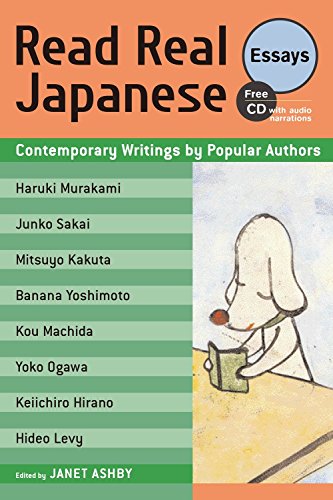 Reddit reviews Read Real Japanese Essays: Contemporary Writings by Popular Authors
Reddit reviews Read Real Japanese Essays: Contemporary Writings by Popular Authors
We found 9 Reddit comments about Read Real Japanese Essays: Contemporary Writings by Popular Authors. Here are the top ones, ranked by their Reddit score.

Kodansha
Post Genki II Stuff
https://www.amazon.com/Living-Japanese-Diversity-Lifestyles-Conversations/dp/030010958X/ref=sr_1_2?ie=UTF8&qid=1469162331&sr=8-2&keywords=living+japanese
I think that is an amazing recourse. Natural, REAL conversations with people of all ages and topics. Its really good for getting exposure you can learn from easily to native speaking that isn't "dramatized" or too over the top like most anime and Japanese TV acting in general.
LingQ.com (is also a great recourse. and its free if you don't use the in site word marking tools)
https://www.amazon.com/Read-Real-Japanese-Fiction-Contemporary/dp/1568365292/ref=sr_1_1?ie=UTF8&qid=1469162459&sr=8-1&keywords=read+real+japanese
https://www.amazon.com/Read-Real-Japanese-Essays-Contemporary/dp/1568364148/ref=sr_1_2?ie=UTF8&qid=1469162459&sr=8-2&keywords=read+real+japanese
https://www.amazon.com/Breaking-into-Japanese-Literature-Classics/dp/1568364156/ref=sr_1_3?ie=UTF8&qid=1469162459&sr=8-3&keywords=read+real+japanese
the last three are good for written japanese, which is more polished and different than real "spoken" japanese (like any language). But they all 3 come with audio, grammar and vocab explanations and are an amazing recourse IMO.
I wouldn't go for something like Murakami to practice translation because, as atgm points out, the translators wouldn't be translating 1:1.
Why not try one of the "Breaking into Japanese Literature" or "Read Real Japanese" books (any kind of reader really)? They usually come with a direct translation and a more artistic translation. The texts are shorter which should keep your interest up for longer but there's still enough stories for you to have enough to do.
There's plenty of others but a few examples would be:
Breaking into Japanese Literature: Seven Modern Classics in Parallel Text
Exploring Japanese Literature: Read Mishima, Tanizaki, and Kawabata in the Original
Read Real Japanese Fiction: Short Stories by Contemporary Writers
Read Real Japanese: All You Need to Enjoy Eight Contemporary Writers
Read Real Japanese Essays: Contemporary Writings by Popular Authors
I think all of those had the "look inside" enabled so you can decide which style of translation you prefer.
If translation is something that interests you, I recommend heading over to /r/translationstudies to get a few tips on good books on translation studies.
There's three great books out there that I can think of off the top of my head.
[Read Real Japanese: Short Stories by Contemporary Writers] (http://www.amazon.co.jp/Read-Real-Japanese-Fiction-Contemporary/dp/1568365292)
and
[Read Real Japanese Essays: Contemporary Writings by Popular Authors] (http://www.amazon.co.jp/Read-Real-Japanese-Essays-Contemporary/dp/1568364148)
and
[Breaking into Japanese literature: Seven Modern Classics in Parallel Text] (http://www.amazon.co.jp/Breaking-into-Japanese-Literature-Classics/dp/1568364156)
PS: if you are "fresh out of Genki 2" level, I'd say these books may be fairly advanced for you, but to each their own. Some people don't mind. There are english translations after all.
Is it the read real japanese series? I remember someone mentioning it to me a while back but i forgot about it until your post.
WRT grammar i don't know what it is but I always end up overcomplicating what should be a basic sentence. Especially when i'm not actively trying to think of the most efficient way to say something. It's something I do in English too but since I'm not a native Japanese speaker it just comes off as super awkward, rather than me being relatively long-winded.
I do need to brush up on certain rules that I understand when heard, but tend to fuck up when i'm trying to use though...(causative form comes to mind)
also ty
While I personally do not know any, as I am a beginner (for like, 4 or six years due to my lack of studying :D )
u/overactive-bladder had shown me some.
https://www.amazon.fr/Read-Real-Japanese-Essays-Contemporary/dp/1568364148/ref=pd_sim_14_1/259-4279497-3692713?_encoding=UTF8&pd_rd_i=1568364148&pd_rd_r=d172be83-a0ea-11e9-a0e7-ff5133ca3569&pd_rd_w=0Ju56&pd_rd_wg=onHm2&pf_rd_p=7e133c34-2a2a-4f4f-8372-6a26c70ca073&pf_rd_r=47RS5KNR1PN2A3V66MX8&psc=1&refRID=47RS5KNR1PN2A3V66MX8
exploring japanese literature: https://www.amazon.fr/Exploring-Japanese-Literature-Tanizaki-Kawabata/dp/1568365411/ref=pd_sim_14_5/259-4279497-3692713?_encoding=UTF8&pd_rd_i=1568365411&pd_rd_r=d172be83-a0ea-11e9-a0e7-ff5133ca3569&pd_rd_w=0Ju56&pd_rd_wg=onHm2&pf_rd_p=7e133c34-2a2a-4f4f-8372-6a26c70ca073&pf_rd_r=47RS5KNR1PN2A3V66MX8&psc=1&refRID=47RS5KNR1PN2A3V66MX8
there are many graded readers out there with exactly what you're describing though.
https://www.amazon.fr/Read-Real-Japanese-Essays-Contemporary/dp/1568364148/ref=pd_sim_14_1/259-4279497-3692713?_encoding=UTF8&pd_rd_i=1568364148&pd_rd_r=d172be83-a0ea-11e9-a0e7-ff5133ca3569&pd_rd_w=0Ju56&pd_rd_wg=onHm2&pf_rd_p=7e133c34-2a2a-4f4f-8372-6a26c70ca073&pf_rd_r=47RS5KNR1PN2A3V66MX8&psc=1&refRID=47RS5KNR1PN2A3V66MX8
exploring japanese literature: https://www.amazon.fr/Exploring-Japanese-Literature-Tanizaki-Kawabata/dp/1568365411/ref=pd_sim_14_5/259-4279497-3692713?_encoding=UTF8&pd_rd_i=1568365411&pd_rd_r=d172be83-a0ea-11e9-a0e7-ff5133ca3569&pd_rd_w=0Ju56&pd_rd_wg=onHm2&pf_rd_p=7e133c34-2a2a-4f4f-8372-6a26c70ca073&pf_rd_r=47RS5KNR1PN2A3V66MX8&psc=1&refRID=47RS5KNR1PN2A3V66MX8
also, i am a native middle eastern and i studied arabic there. now that i moved away (thank god) i am anxious of losing my dialect and the written language. i have been looking into getting back into kawa3ed for the harakat part. even natives mess up a LOT. i still remember my arabic teacher saying "i always cringe when i hear a news reporter screw up the kawa3ed lmfao.
if you are still at the level where you feel like you need English translation, maybe try something like satori reader or the Read Real Japanese books. They will have information on the grammar and explain nuances to you which is a lot better for learning than trying to compare to the English translation. As other have said translation isn't literal, and I don't think it will help you know if you got it right in all cases. That said I do sometimes read stories which I have read in English as at least I know the basic premise and it helps me figure things out in a broader context.
Anyone ever read the "Read Real Japanese" books?
http://www.amazon.com/Read-Real-Japanese-Fiction-Contemporary/dp/1568365292 Fiction
http://www.amazon.com/Read-Real-Japanese-Essays-Contemporary/dp/1568364148 Essays
I was looking at them in the bookstore, and they seem to have interesting authors. But I couldn't tell if it is really any help in learning, or if it is something you need to be pretty advanced to get anything out of.